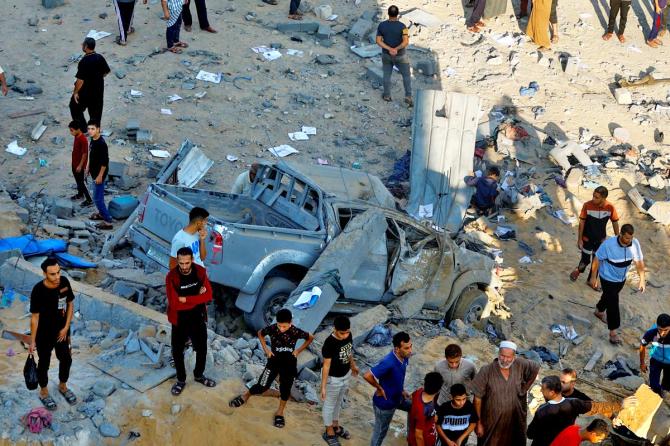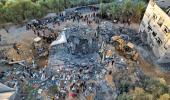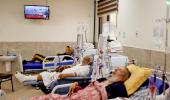The 13,000-strong staff working with the United Nations agency for Palestinian refugees is “terrified and tired” and described the situation in the Hamas-run Gaza Strip as a “hellhole”, a spokeswoman for the agency said.

The United Nations Relief and Works Agency for Palestine Refugees in the Near East (UNRWA) is the largest UN agency working in the Gaza Strip, both in terms of the size of its operations as well as the number of staff.
The 13,000-strong UNRWA staff in Gaza includes teachers, doctors, nurses, pharmacists, warehouse workers, logisticians, technicians and drivers.
“We have a very, very big operation in the Gaza Strip. What we hear from our staff is that… they are terrified and they're tired. They want all of this to come to an end and the message that we're getting is: ‘Get us out of this hellhole. This has become hell',” UNRWA Director of Communications Juliette Touma told reporters at United Nations through video conference on the humanitarian situation in Gaza.
Touma said the messages of ‘SOS' have worsened by the day amidst Israel's weeklong siege and bombardment.
"The mood is going down. I feel the level of desperation is going up. Uncertainty, really from one hour to another, fear. That's what our staff has been sharing with us," she said.
Touma said that since the current conflict began when Hamas launched an audacious terror attack on Israel on October 7 and the Jewish state declared war on the militant group, about one million Palestinians have been displaced and nearly half of them are sheltering in UNRWA schools in the Gaza Strip.
The UNRWA has lost 14 of its staff members who worked in the Gaza Strip and several other personnel working with the UN agency have been displaced since the start of the conflict ten days ago.
Touma said that many UNRWA staff members have taken refuge with friends and relatives but scores more have taken shelter in UNRWA facilities, including in units that were not meant to become shelters, including a huge warehouse that was used to store UNRWA supplies. “So their situation is quite dire,” she said.

Late last week, Israel issued an ultimatum that the entire population of Gaza north of Wadi Gaza, approximately 1.1 million people, should relocate to southern Gaza within 24 hours.
The situation is rapidly deteriorating with each passing hour as Gaza runs out of food, water, fuel and essential supplies.
“The siege on the Gaza Strip continues. The UNRWA has not been able to bring in any supplies since October 7 and our own supplies are running out and they're running out fast,” Touma said.
She said that UNRWA colleagues who continue to be in Gaza and aim to deliver for people in the strip are themselves down to one litre of water a day.
It's a “very tragic situation on the ground. Bombardment and airstrikes continued in Gaza. Our own staff are impacted as well, terrified, very, very worried for what the next hour will bring, let alone what the next day will bring,” she said.
She added that the UNRWA staff and personnel say they “cannot even reassure their children to tell them that it's going to be okay because maybe it's not going to be okay".
“We feel that the levels of desperation, frustration and exhaustion among our staff specifically increase by the hour. The longer this goes on, the longer the fatigue, the exhaustion, the frustration,” she said.
The UNRWA is urgently calling for the siege on the Gaza Strip to be lifted in order to ensure that UN agencies and other humanitarian bodies are able to bring in much-needed supplies into the Gaza Strip and provide assistance to those in need.
Touma voiced concern that UNRWA shelters are overcrowded and do not have enough sanitation services.
"We are getting reports that hundreds of people are sharing one toilet. We do have serious concerns about the spread of waterborne diseases in the Gaza Strip, especially among those displaced,” she said.

According to an update from the UN Office for the Coordination of Humanitarian Affairs (OCHA) on hostilities in the Gaza Strip and Israel, the siege of Gaza continues and the Rafah Crossing has remained closed, preventing the entry of desperately needed humanitarian aid, including food, water and medicines awaiting on the Egyptian side.
Gaza has been under full electricity blackout for the sixth consecutive day.
“Hospitals are on the brink of collapse as their fuel reserves used to operate backup generators have been almost totally depleted, endangering the lives of thousands of patients,” the update said.
On Sunday, the Israeli authorities resumed partial water supply to the eastern Khan Younis area, providing less than four per cent of the water consumed in the Gaza Strip prior to the hostilities, OCHA said.
Given the collapse of virtually all water and sanitation services in Gaza, the UNICEF-led WASH Cluster stated that the population is at imminent risk of death or infectious disease outbreak if water and fuel are not immediately allowed to enter the Strip, it added.
According to the Israeli military, at least 199 people are held captive in Gaza, including Israelis and foreign nationals, the agency added.
On Monday, UN's emergency relief chief Martin Griffiths expressed deep concern about the deepening humanitarian crisis in Gaza and about the fate of Israeli hostages, stressing that “they have to be let out straight away”.
Since the start of hostilities, as many as 2,778 Palestinians have been killed and 9,938 have been injured.
According to official Israeli sources, at least 1,300 Israelis and foreign nationals have been killed in Israel, and at least 4,121 have been injured, the vast majority on October 7, the OCHA update said.










